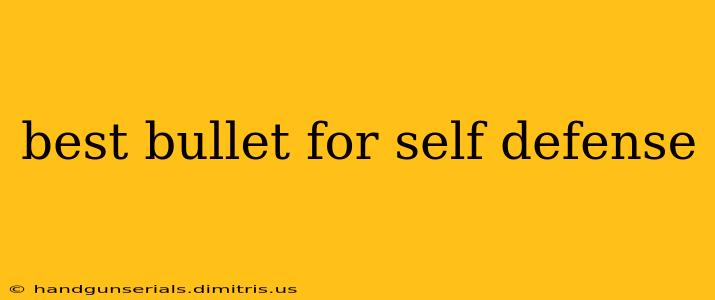Choosing the right ammunition for self-defense is a critical decision, impacting the effectiveness and legality of your actions. There's no single "best" bullet, as the ideal choice depends on several factors including your firearm, the type of threat, and your personal shooting skills. However, this guide will explore the top contenders and the crucial considerations in making an informed decision.
Understanding Bullet Characteristics
Before delving into specific bullet types, let's examine the key characteristics that determine their effectiveness in self-defense:
-
Expansion: The ability of a bullet to expand upon impact, creating a larger wound channel and increasing stopping power. Excessive expansion can lead to overpenetration, however.
-
Penetration: The depth to which a bullet penetrates a target. Sufficient penetration is crucial to reach vital organs, while overpenetration poses a significant risk to bystanders.
-
Fragmentation: Whether the bullet breaks apart upon impact, creating multiple wound channels. While offering increased stopping power, fragmentation also increases the risk of unpredictable trajectory.
-
Caliber: The diameter of the bullet, expressed in inches or millimeters. Larger calibers generally deliver more energy, but may also have increased recoil.
Top Bullet Contenders for Self-Defense
Several bullet types consistently rank highly for self-defense applications:
1. Hollow Point Bullets (JHP):
- Mechanism: These bullets feature a hollow cavity in the tip, designed to expand upon impact. This expansion creates a larger wound cavity, increasing the likelihood of incapacitating the threat.
- Advantages: High expansion, good stopping power.
- Disadvantages: Can be prone to jamming in some firearms, performance can vary depending on velocity and target material. Some JHPs may not expand reliably at lower velocities.
2. Jacketed Hollow Point (JHP):
- Mechanism: Similar to hollow points, but the jacket (typically copper) remains intact, offering more consistent expansion and reducing lead fouling in the barrel.
- Advantages: Consistent expansion, less lead fouling, reliable performance.
- Disadvantages: Generally slightly less expansion than some non-jacketed hollow points.
3. Full Metal Jacket (FMJ):
- Mechanism: A full metal jacket completely encases the lead core, preventing expansion.
- Advantages: High penetration, consistent performance.
- Disadvantages: Lower stopping power than expanding bullets; increased risk of overpenetration and potential harm to bystanders. Generally not recommended for self-defense.
4. Bonded JHPs:
- Mechanism: The lead core is bonded to the jacket, preventing core separation during expansion. This offers consistent performance even at lower velocities.
- Advantages: Extremely reliable expansion, consistent penetration, good stopping power.
- Disadvantages: Often more expensive than other options.
Factors to Consider Beyond Bullet Type
The bullet itself is only one piece of the puzzle. Other crucial factors include:
- Your Firearm: Certain firearms may perform better with specific bullet types. Consult your firearm's manual for recommended ammunition.
- Your Training: Proper training is paramount for effective self-defense. Knowing your firearm and ammunition is crucial for safe and effective use.
- Legal Considerations: Ammunition laws vary by jurisdiction. Ensure your chosen ammunition is legal in your area.
Conclusion: Prioritize Training and Responsible Ownership
The "best" bullet for self-defense is subjective and depends on individual circumstances. However, hollow point and bonded hollow point bullets generally offer a superior combination of expansion and penetration for self-defense applications. Prioritizing professional training, understanding your firearm's limitations, and adhering to all applicable laws are far more important than focusing solely on a specific bullet type. Remember, responsible gun ownership is crucial for safe and effective self-defense. This information is for educational purposes only and does not constitute legal or professional advice. Always consult with qualified professionals before making any decisions regarding self-defense and firearms.

